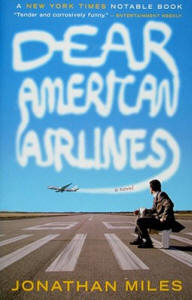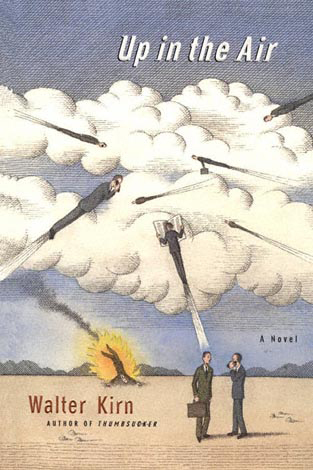
The protagonists of Walter Kirn’s 2001 novel Up in the Air and Jonathan Miles’ 2008 book Dear American Airlines represent opposite ends of the air-travel spectrum. Consultant Ryan Bingham, the narrator of Kirn’s book, spends virtually his entire life in transit, professing to prefer the rhythms of travel to a more stationary existence, while translator Benjamin R. Ford of Dear American Airlines finds a once-in-a-lifetime family obligation a good reason to leave his Manhattan townhouse for the first time in decades. Still, both these characters reflect that, however ambivalent Americans may be toward air travel, it’s a privilege they take for granted and are loath to give up.
Up in the Air’s Bingham has just resigned from his job as a “career transition counselor,” called in to talk to employees who have just lost their jobs — an occupation he fell into because he “wasn’t strong,” though it’s not hard to imagine him returning to it in this current economic downturn. (A movie adaptation starring George Clooney as a noticeably older Bingham, this time tailed by a bright-eyed trainee who openly challenges his lifestyle, is scheduled for release later this month.)
Bingham’s primary means of entertainment during the near-constant traveling (so intense, he has even given up his apartment) comes from racking up miles on the fictional Great West Airlines in pursuit of the elusive one-million-mile mark. He’s idealized the moment down to where it ought to happen (over the Great Plains) and how he’ll celebrate (with a disposable camera and a copy of a story he wrote in college about his happy childhood).
Bingham sees himself as a citizen of “Airworld,” a largely anonymous, sanitized life in which recognizable chain restaurants represent open arms and every city is a series of ring roads, while simultaneously aware that his ardor for it is perhaps the most unique thing about him. As he faces the end of his traveling days, Kirn suggests he won’t be able to give up his highly mobile lifestyle by writing in a love interest (who, in a twist, was laid off by him on a previous trip) and dangling in front of him the prospect of working for a mysterious international conglomerate called MythTech, which Bingham believes is spying on him at various stops. While Kirn begins his book with the itinerary of Bingham’s last week, his destinations are unimportant; for Bingham, the cities are meaningless without the miles that will allow him to achieve his goal.
Bingham would never want to get in line for security behind Benjamin R. Ford, the narrator of Dear American Airlines, whose lengthy complaint forms the text of Miles’ debut novels. (Both narrators are writers, though Ford is largely a translator; Bingham’s book The Garage, which he discovers he unwittingly plagiarized from one of his counselees, is a vacuous management parable.) Unlike Bingham, Ford is not a frequent traveler, nor is he on the road on business. After receiving an invitation to his estranged daughter’s wedding in California, he decides to book a ticket based on a long-ago gibe he made to the girl’s mother about walking her down the aisle. (Both women are named Stella; since Ford formerly lived in New Orleans, inevitably he finds himself locked out of their shared house before his wife leaves him, yelling out her name before feeling properly foolish.)
Ford catalogs the indignities of his position — stranded at Chicago’s O’Hare International Airport — as if experiencing the well-known inconveniences of air travel for the first time: Each type of seating is uniquely uncomfortable; the best offer of a diversion is Sudoku; and the stores in the terminal don’t carry his brand of cigarette. As Ford periodically leaves the terminal for a smoke break, he believes that one particular guard has been singling him out for extra searches. For a middle-aged white man, such scrutiny is merely an irritant, but his predicament hints at the very real debate over racial profiling at security checkpoints.
As one of thousands stranded at O’Hare due to an undefined error, Ford is on the verge of not being able to fulfill his promise — “Dear American Airlines,” he writes, “since when did you start canceling flights in midair?” — but his request for a ticket refund blossoms under author Miles’ careful cultivation into an homage to a life well lived as well as a laundry list of regrets. In the final pages, he confesses that he was thinking of committing suicide at his destination, making his unexpected layover a Beckettian pause, not just a disturbing interruption. Like Bingham, Ford is on a quest, and he is never so insistent on his right to travel as when he believes that it is about to be taken away by the titular airline.
In believing himself alone in “Airworld,” Ryan Bingham errs; more Americans than ever took to the skies in the past 10 years thanks to discounted rates and the rise of new carriers to challenge the legacy airlines. But if the doomsayers are correct, Bingham’s way of life may become the stuff of fiction in a generation or two. Even though oil prices have fallen from last year’s highs, experts continue to predict the demise of affordable mass air travel.
In “Airworld,” it’s the Binghams, not the Fords, who fill most of its seats. Take away the road warriors — or make their journeys unnecessary with videoconference equipment and “greener” office policies — and the legacy carriers will be courting bankruptcy within a year. But the Fords, who choose to travel, will suffer the most as commercial flights become more expensive. In the closing pages of Dear American Airlines, Ford is finally headed to his destination, planning to make it if not to his daughter’s wedding, then to the reception. The obstacles to his journey have, if not exactly melted away, only served to convince him of its necessity.

- Follow us on Twitter: @inthefray
- Comment on stories or like us on Facebook
- Subscribe to our free email newsletter
- Send us your writing, photography, or artwork
- Republish our Creative Commons-licensed content

